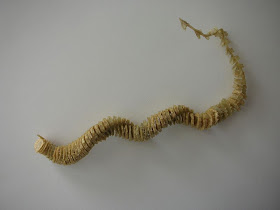
One of the interesting things about fishing in tidal waters is that you get to see a lot of things most folks miss. I spend a lot of time under bridges. Today I was under the bridge where Route 109 leads into Cape May.
I stumbled upon a dead deer there, its still furry head turned awkwardly towards its magnificent rib cage. No meat was left.
The huge rib cage dwarfed the rest of the dead creature. Deer have a simple survival strategy--run. They need oxygen, and lots of it.
***
I went fishing today. I slaughtered 10 clams, and fed a few fish. I hooked none. The clams were tough to open. When threatened, clams have a simple survival strategy--they, well, clam up.
The only visible living thing I hooked was a chain of whelk eggs--the embryonic whelk oozed onto my hand like the raw eggs they were. Whelks eat clams.
Call it a draw.

***
We are starting to use UbD--Understanding by Design--here in Bloomfield. It was developed by Grant Wiggins, and he's made a cottage industry (and a lot of money) out of it. It's useful, but not new.
Part of our task is to develop essential questions. I need to develop a few for evolution.
I considered this one:
Were humans inevitable?
***
What is our survival strategy?
In terms of a few generations, our brains are an advantage. In terms of a few generations, our opposable thumbs are an advantage.
Humans (Homo sapiens sapiens) have not been around that long, maybe 10,000 generations, not even 200,000 years.
Our intelligence may ultimately be the end of us.
More than a few human cultures, Homo sapiens sapiens cultures, have been sustainable, at least until other Homo sapiens sapiens cultures intervened.
How do we teach this? How do we not?
I thought about the turtle the other day. My three year old asked me if turtles were around during the time of mammoths. I couldn't answer him. Somewhere around the fourth grade, I learned that I'm "not good in science."
ReplyDeleteA lot of websites said that they've been around since the dinosaurs. When I told Joel that, he asked me how I knew. I told him that I looked it up online. He asked me how "online knew it," and I explained the internet. I'm not sure three year olds get that concept. Maybe that's a good thing.
It got me thinking about turtles and humans and the old fable about the tortoise and the hare. I wonder if, in the longer evolutionary race, we're like the hare. I wonder if we'll cause our own destruction and the turtle will slowly move on.
From how we treat other living things (including other humans) shows how little humanity we have. The current state of our world is testimony to ego and I think other organisms will far outlast us because of it. We were not inevitable and most likely our demise will occur as well whether from our hands or another organism. In the natural world that is how it is meant to be. We cannot keep believing the natural world exists for us alone and refuse to see the relationships/interrelationships.
ReplyDeleteDear John,
ReplyDeleteI confuse my students with this, but everything alive now has been evolving and around as long as everything else alive--though we might not recognize our older forms.
We are, alas, already causing our own destruction. We became finite gods when we figured out how fix nitrogen, a task formerly relegated to bacteria and the occasional lightning bolt. I suspect we will soon exceed our carrying capacity--indeed, we may have already.
I think your son will be teaching you as much as you teach him--glad to see another critical thinker emerging!
We are, of course, no more evolved than the earthworm--we're both fairly suited for our niche, and will be less so as the environment changes.
I am willing to bet, though, that the turtle form outlasts the human one. It certainly has a longer track record.
Dear Louise,
ReplyDeleteWe are, of course, an integral part of the natural world, and as depressing as it is to see some of the changes that have occurred because of our lack of imagination and love, I find comfort in being part of this larger inexplicable whole.
Black clouds surround these thoughts in February--now in April they lead me to ecstatic dancing. Neither is effective (if "effectiveness" is defined as advancing (whatever that means) the species), but dance is a lot more fun than depression.
Whether we see the interrelationships does not make them less true, as you know--I realize that I am preaching to the choir. All of us will see them soon enough.